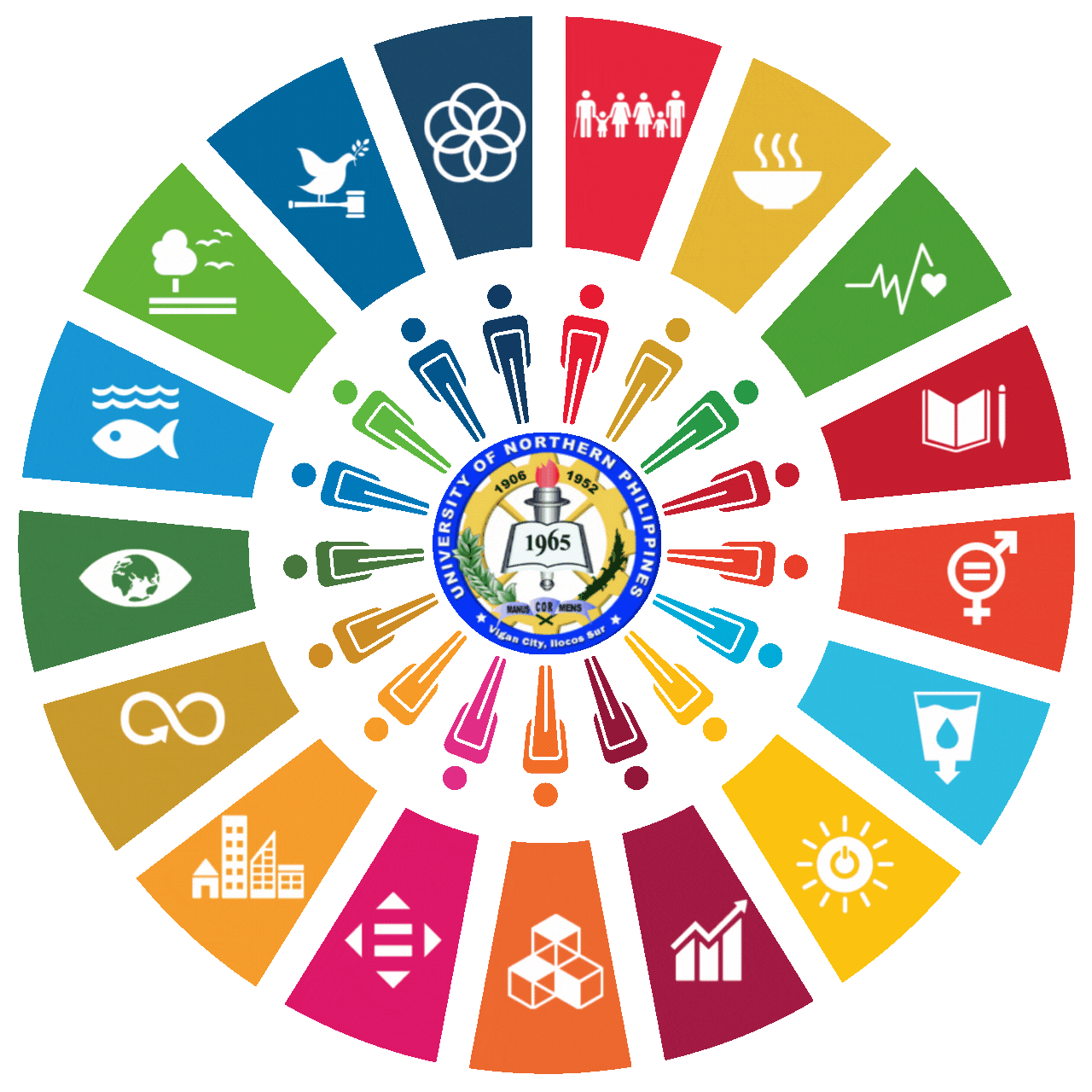HIGHLIGHTS
BRIEFER
2024

BRIEFER

SDG 5 - GENDER EQUALITY
The University of Northern Philippines (UNP) demonstrates inclusive commitment to gender equality through different ented initiatives led by the Center for Gender and Development (CGAD), spanning advocacy campaigns, capacity building programs, policy reforms, and community outreach. UNP celebrated National Women's Month with the theme "Lipunang Patas sa Bagong Pilipinas; Kakayahan ng Kababaihan, patutunayan!" promoting for women's empowerment and inclusive development, while clinching the Best Gender and Development Corner recognition during the 2024 celebration. The university participated in the nationwide 18-Day Campaign to End Violence Against Women with the theme "VAW Bigyang-Wakas, Ngayon na ang Oras!" mobilizing the community through symposiums, film festivals, and awareness activities. The Open University and CGAD launched symposiums highlighting critical laws including the Anti-Rape Law, Anti-Sexual Harassment Act, and Expanded Anti-Trafficking in Persons Act, while the Department of Social Sciences and Philosophy partnered with CGAD to administer the "Juana Film Festival" featuring short films addressing violence against women and children. The student organization POLIS presented stage plays raising VAWC awareness, while the College of Law provided lectures on the Safe Spaces Act to Persons Deprived of Liberty, educating vulnerable populations on gender-responsive legislation protecting individuals from sexual harassment and gender-based violence.
UNP implements extensive gender sensitivity training and education programs across multiple institutions. CGAD conducted gender sensitivity training for health workers ensuring gender-sensitive service delivery, held seminars for teachers from four schools promoting equitable and inclusive education, and provided training to faculty and students of partner institutions in collaboration with the Department of Social Sciences and Philosophy. The College of Teacher Education held Home Economics Day celebrations challenging traditional gender roles and promoting equal responsibility sharing within families, conducted Gender and Development workshops for teachers and non-teaching staff at local high schools enhancing teaching practices and classroom inclusivity, and organized seminars on gender-responsive teaching strategies in the MATATAG curriculum preparing future educators for equitable curriculum implementation. The Bachelor of Secondary Education program delivered GAD workshops educating future teachers on gender-responsive pedagogy, while the Guidance and Counseling Services, Information and Orientation Services, CGAD, and College of Law collaborated on the "VAWCk to Basics" symposium educating student leaders on gender-related laws empowering them as advocates. A faculty member was certified as a member of the national Gender and Development resource pool, highlighting UNP's expertise in gender-responsive education.
UNP promotes inclusive policies and infrastructure supporting gender equality and women's empowerment. The Student Council launched a gender-neutral uniform policy promoting inclusivity and challenging traditional gender norms in academic settings, creating a more welcoming and accepting environment for all students regardless of gender identity. The Medical Services Office and CGAD collaborated to establish a breastfeeding room providing a private, hygienic, and comfortable space for working mothers, recognizing and supporting unpaid care work and enabling them to balance professional responsibilities with maternal duties. CGAD participated in radio programs raising public awareness on gender issues, conducted lectures in local communities extending awareness beyond campus during Women's Month, held seminars empowering communities through inclusive practices, and organized the "Orange Your Facade" contest raising awareness about gender-related issues. The university congratulated new Faculty Union officers including women in leadership positions signifying progress in ensuring women's full and effective participation and equal opportunities for leadership at all decision-making levels.
UNP forges strategic partnerships and extends gender advocacy to communities throughout the region. CGAD conducted talks on gender roles and signed memoranda of agreement with high schools to formally adopt schools and promote gender-sensitive academic environments, while the JBA led partnerships and seminars on gender in Pantay Fatima promoting awareness in local communities. Three university offices collaborated to promote gender and development initiatives in Cabugao, while Vigan barangays received gender and development programs from the university. The University Extension Office conducted orientations on the Gender-Responsive and Empowering Local Governance (GeRL) assessment tool for gender-responsive local governance, while UNP partnered with TESDA and the Women's League to provide skills training and opportunities specifically for women promoting their economic empowerment. The College of Business Administration and Accountancy conducted gender-harmonized skills training on fish and meat processing providing equal opportunities for men and women, while Project LA.P.I.S. was launched in Nagtupacan and Pudoc Elementary Schools promoting equal access to education for children. The College of Medicine conducted knowledge-sharing sessions on cervical cancer during International Women's Day raising awareness about significant health risks for women promoting early detection and prevention, while the Open University and CGAD hosted symposiums on LGBTQ+ advocacy titled "Creating Inclusive Spaces: Strategies for LGBTQ+ Advocacy in Academic Settings" addressing representation and support within the educational sector ensuring all students feel safe, respected, and valued. Through systematic documentation of 51 initiatives spanning advocacy campaigns, violence prevention, capacity building, inclusive policies, community partnerships, and LGBTQ+ support, UNP demonstrates that achieving gender equality requires coordinated multi-dimensional efforts addressing discrimination, violence, economic empowerment, and inclusive participation, positioning the university as a catalyst for gender justice and women's empowerment in the Ilocos region and beyond.
Read more

DSSP, CGAD continue advocacy on VAWC through Juana Film Fest



















